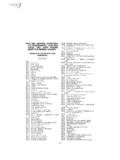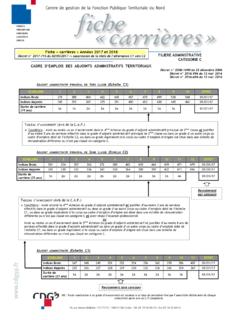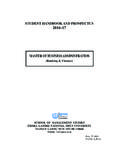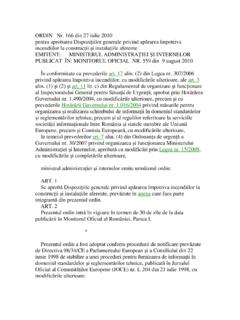Transcription of Cllallenges to effective prison governance in South Africa
1 Cllallenges to effective prison governance in South Africa CHRIS TAPSCOTT Prqfessor and Deal1, Faculty qf Economic and Management Sciences. lJnlver-Sity oj the WeMern Cape INTRODUCTION The HnprisonmerH of oftenders remains a subjec[ of comen[lon world-wide, wl[h proponenLs arguing altcrnauvely for stricter sCrHencing re-gimes, for improved securi[y or for the Introduction of more effec[ive programmes of rehabilaation. However, despi[e the fan [hal prisons fall undcr [he constanL scru[iny of the meuia and feature prominently in dlvcrgcrH poli[ical dcba[cs, generally 1i([le is known abou[ [he administra-[ion of these insti[wions.)]]]]]]]]]]]]]]]]
2 As Coyle observes, [he success of a prison is often measurcd in [he eyes of [hc public by [hc absencc of failure, and [0 [hat extent, a ' prison is successfully managcd whcn there arc no escapes or rims'. Funhermore, despite vas[ imernational li[eracure on correc-tional ins[ilU[ions, [heir objec[(ves and [heir treatment of offenders, rela[ively li[[le systematic analySiS has been undertaken on [he fac[Ors which contribute [0 good prison governance As Coyle affirms, while [here is a wide seleccion of literature on [he theory and pracrice on [he management of large public institutions such as schools and hospitals, comparatively li[[le has been wri[[en about the management of prisons.)]]]]]]]]]]]]]]]]]]]]]]]]]]
3 This, he rndlntllins, 'is panly because [he world of prisons i[self remains relatively closcd. I[ IS also because unlll quite recen[ly it was nO[ ac-knowledged that thcre is a panicular set of sl,ills required [0 manage prisons properly"-In [he Pdst, he asserts, basic legal or administrative skills (whe[her acquired [hrough the Civil service or through lhe mili[ary), were deemed sufficient experience for the purposes of managing a pflson Persistent reports of human fights auuses in custoulal InstitUlions, to-ge[her with their singular lallure [()]]]]]]]]]]]]
4 Rehabilitate and reintegra[e offenders into society, have promp[ed periodic a[[emp[s at prison reform_ Such llt[emp[s a[ reform have frequently occurred in [he aftermarh of major I Ht'S(!rHcil lor llw, PdlWf Wd~ condllned ullder (he ot (Ile (Ivll SO( wty Pri'>oll Ih'turm Irllll,llive (C~PHI 1. arl H11(lcHllit; 411 Iht' (OJlIIlIUlIlIY La .. " ("('rlln' ill lilt' lIrllverSIlY u(" (he: Wt:~(t'rn "Ill(' dUlh(Jr would li!;t: 10 ("XPTl"~~ clppreClilllOIl (0 lilt' Department til ()ff('( liollcll ~t:rvi(" , wh1l'11 I,ll Illldled [lit' fldd wurh tor Ihe sludy 2.))))))))))))))))))))]]]]]]]]]]
5 Coyl(' A 'Mdlldgillg pflson~ III d lillie: ' ',lIrt: fur Pn'>ofl ~I\Jdit"~ (20()2) "12 ") 11m! ill 17 Reproduced by Sabinet Gateway under licence granted by the Publisher (dated 2009).LAW, DEMOCRACY &. DEYELOPMENT political [ransformation, as was the case in many former Eas[ern Bloc countries as well as in Latin America and Amongst the most com-mon characteristics of this reform process have been the efforts to demilita-rise sys[ems of prison administration and to imroduce forms of civilian management. The experience of these countries, which typically aspire to imernational norms, has seldom been an unproblema[ic one and the proc-ess has often led to a loss of morale and discipline among custodial staff.]]]]
6 As a microcosm of the broader society. the correctional services in South Africa have undergone dramatic institutional change in the decade following the end of Apartheid rule. This, inter alia. emailed a precipitous shift from a militaristic administration to a civilian mode of governance ,'" and a commitment to full compliance with the provisions of the Constitution of South Africa as well as international instruments in relation to the honouring of the basiC human rights of offenders. !imited only where justifiable and necessary within a correctional environment.
7 " The process of reform and restructuring has, however, created institu-tional instability, which has adversely affected the governance of prisons across the Significantly, it has also, for the first time, opened up prisons (0 public scrutiny. It has been in this context that the Jali the Law Society9 and other independent investigatorslO have, over the course of the past five years, uncovered numerous instances of mismanagement and corruption and have raised serious questions about the status of prison governance in South Africa . These concerns, raised by poli[icians, academiCS.)]
8 [he media and the general public. however, have tended to be strong in indignation and weak on policy recommendations as to how [he governance of these insti-tutions might be improved. In part. this stems from the fact that under-standings of prison governance are limi[ed to critique of the administra-tive regime in place. Overlooked is the fact that the effective governance of any correctional institution is a function nOt only of the state's adminis-trative efficiency. but also of the extent to which society. at large, under-stands and engages in, the challenges faced in combating crime and in 4 Barclay A "'Demililarisi.]]]
9 Ltion" in prison services in CenrraJ and Eas[ern Europe' Po~j[iofl Paper, Interna[ional Centre for prison Sludies (2003) 3. 5 ~or a discussion of Lhis process. see Dissel A and ElliS S 'Rerorrn and slasis: Transfor-malion in Soulh African prisons' Cemre for Sludy of Violence and Reconcilialion (2003). 6 Departmem of Correctional Services White Paper on Corrections in South Africa (2005) 18. 7 See Slolh-Nlelsen J 'Overview of policy developments in Soulh African Correclional Services 1994-2002' (SPRI Research Paper Series (July 2003). 8 For an overview of lhe Objectives of lhe Jali Commission, sce Sekhonyanc M 'Showing its leelh: [he Jali Commission on prison corruption' (November 2002) 2 SA Cnme Quar-terly.)]]]]
10 9 Law Society of Soulh Africa Pnson report (2003) 10 See. [or example, Painler-Morland el al (2003) 'Focussed assessment of anti-corruplion capacilY withm the Department of Correclional Scrvices' Uni[cd Na[ions Office on Drugs and Cnmc. Dcpartmcnt of Public Service and Administration, Business Enter-prises, University of PrelOria (2003) 2 Reproduced by Sabinet Gateway under licence granted by the Publisher (dated 2009).CI I!\ TO nfoECTIVE I'I{ISQN (iOVEHNANCF IN SOU n I AfoRICA incarceraling and rehdbJlitating offenders. These relate to Issues of SOCIO' economic development in the broader commutl1ty, to policing.)]]]}













